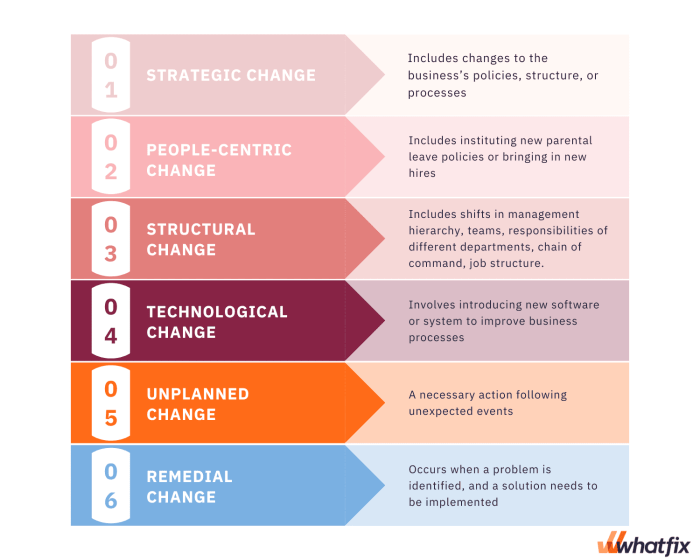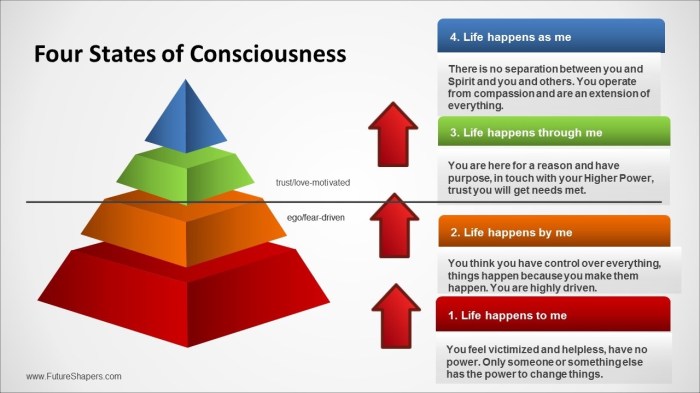One’s consciousness changes as one encounters new experiences, embarking on a transformative journey that shapes our perceptions, beliefs, and understanding of the world. This dynamic interplay between consciousness and experience lies at the heart of our human existence, influencing our thoughts, emotions, and actions.
As we navigate novel situations, unfamiliar environments, and meaningful interactions, our consciousness undergoes profound shifts. These experiences challenge our existing mental frameworks, prompting us to adapt, grow, and evolve. The impact of these transformative encounters extends beyond the immediate moment, leaving lasting imprints on our cognitive landscape.
One’s Consciousness Changes as One Encounters New Experiences

Consciousness, the subjective experience of the world around us, is not static but rather a dynamic process that undergoes constant transformation. Encounters with novel experiences play a pivotal role in shaping and evolving one’s consciousness, influencing perceptions, beliefs, and ways of thinking.
Consciousness Transformation through Experiences
When individuals encounter new experiences, their consciousness undergoes a process of transformation. This transformation involves the integration of new information into existing cognitive structures, leading to the modification or expansion of those structures. Novel experiences can challenge preconceived notions, broaden perspectives, and foster the development of new insights.
Examples of experiences that can trigger consciousness shifts include:
- Traveling to a foreign country and experiencing a different culture
- Reading a book that challenges one’s beliefs
- Participating in a transformative workshop or retreat
Impact of Novel Situations on Consciousness
Unfamiliar or challenging situations can have a significant impact on consciousness. These situations can push individuals outside their comfort zones, forcing them to adapt and grow. The perception and interpretation of novel situations play a crucial role in shaping consciousness during these experiences.
For instance, encountering a natural disaster can trigger feelings of awe and vulnerability, leading to a reevaluation of life priorities. Conversely, facing a difficult work project can evoke feelings of stress and anxiety, but also the potential for increased resilience and self-confidence.
Influence of Social Interactions on Consciousness
Interactions with others can profoundly influence one’s consciousness. Cultural norms, social expectations, and interpersonal relationships shape the way individuals perceive and interpret the world around them. Social interactions can provide a sense of belonging and support, but they can also lead to conformity and the suppression of individual expression.
For example, growing up in a collectivist culture emphasizes the importance of group harmony and interdependence, which can influence an individual’s sense of self and their consciousness.
Role of Introspection in Consciousness Evolution, One’s consciousness changes as one encounters new experiences
Introspection, the act of reflecting on one’s own thoughts, feelings, and experiences, plays a crucial role in understanding and evolving one’s consciousness. Through introspection, individuals can gain insights into their own motivations, beliefs, and values, leading to personal growth and transformation.
Techniques for fostering introspection include meditation, journaling, and spending time in nature.
Integration of New Experiences into Consciousness
Integrating new experiences into one’s consciousness involves the assimilation of new information into existing cognitive structures. This process can be gradual or sudden, depending on the nature of the experience and the individual’s openness to change.
The integration of new experiences can lead to the expansion of one’s consciousness, resulting in a more nuanced understanding of the world and a greater capacity for empathy and compassion.
The Subjective Nature of Consciousness Transformation
It is important to emphasize the subjective nature of consciousness transformation. The way in which consciousness changes in response to new experiences is influenced by individual experiences, perspectives, and beliefs. This subjectivity underscores the unique and personal nature of consciousness.
Common Queries: One’s Consciousness Changes As One Encounters New Experiences
How does consciousness change when we encounter new experiences?
When we encounter new experiences, our consciousness undergoes a process of adaptation and integration. Our existing mental frameworks are challenged, and we may experience shifts in our perceptions, beliefs, and understanding of the world.
What role does introspection play in consciousness evolution?
Introspection allows us to reflect on our own thoughts, feelings, and experiences. By engaging in introspection, we can gain a deeper understanding of our consciousness and its transformative nature. Techniques such as meditation and journaling can facilitate introspection and support the evolution of consciousness.
How do social interactions influence consciousness?
Social interactions play a significant role in shaping our consciousness. Through interactions with others, we encounter diverse perspectives, cultural norms, and social expectations. These interactions can influence our beliefs, values, and behaviors, ultimately contributing to the evolution of our consciousness.

